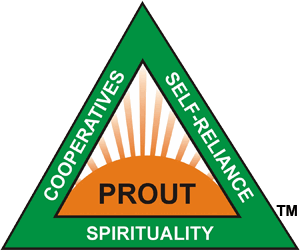Share Card – A Bridge from Capitalism to Prout
By Acarya Vimaleshananda Avadhuta

Society changes. As it happens for human growth the changes might be negligible in the short run but along the years a child becomes an adult and an adult becomes an aged person. Living in a capitalistic society, we may have noticed that changes are happening. Yet we are not able to give a name to the "something else" that is gradually taking shape due to the pressure of the economic downturn. In a transitional time where material security is waning and economic uncertainty is becoming a common place, new forms of economy are taking shape, which are less dependent on the market value of commodities.
Capitalistic economy is very well acquainted with the categories of buying, selling, cost and profit. In a transitional period where the purchasing capacity is lowering there is another emerging category that we can call use or utilization. Suppose that you do not have the money to buy a non-perishable commodity. What other options do you have? Rent, take a loan, use the credit card, exchange, .... what else? You can borrow on a condition of trust. You use a commodity and you return it in the same state after a period of time. This is relatively something common for public libraries where you can borrow books, CD, videos with a library card on the condition of returning them in good state before a certain time. Can the same concept be extended to other commodities, for example, tools, bikes, jewelry, paintings and musical instruments?
In Iowa City the public library carries not only books, CDs and videos for use and return, but also paintings that can furnish a home for three months and keep rotating among users of the library. In Philadelphia there is a tool library where it is possible to use and return work tools like chain saw, skill saw, etc. In some countries of Europe bikes can be used and returned free of charge at the train station. There is nothing new in the concept of borrowing and returning. What can be innovative is to have a membership card that allows to use multiple commodities in different locations and potentially in any country.
We are used to debit, credit and discount merchant cards. Can we envision a "share card" that is only for the use of commodities without having to purchase anything besides a membership? It means that with a yearly fee of $50, for example, you are allowed to borrow, wear and return jewelry worth of thousands of dollars if purchased. It seems incredible but jewelry is actually one of the most durable commodities. Thus, it can be used by multiple people by rotation on a condition of trust.
Renting and sharing are two different categories. In renting no membership condition is required. In sharing, membership is essential. For example, several companies are offering car renting opportunities and also a whole new sector of economy is developing as car sharing. The main difference between renting and sharing is the mind set. In renting you are still a consumer with no interest in maintaining the good state of the commodities besides the penalties you might incur. In sharing there is a cooperative use recognized in the form of membership and potentially rewarded within the same frame.
Envisioning the share card as a economic way to use commodities at large we may consider that producers might recover an interest towards the durability of their goods. They can develop lines of products only for use and not for sale, with higher quality standards. The "use and throw" mentality may get gradually replaced by a more conscious "use and share" way of life. Prout, the Progressive Utilization Theory, in its fifth principle, states, "The method of utilization should vary according to time, place and person, and the utilization should be of a progressive nature."
Is the "share card" a bridge from Capitalism to a Proutist Society?

